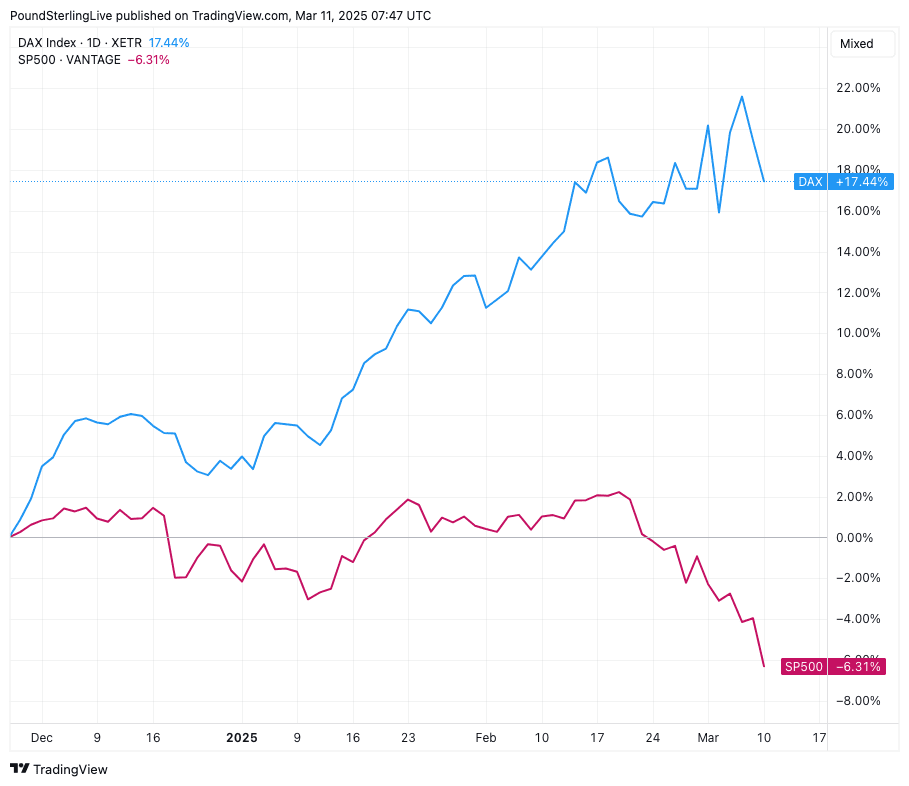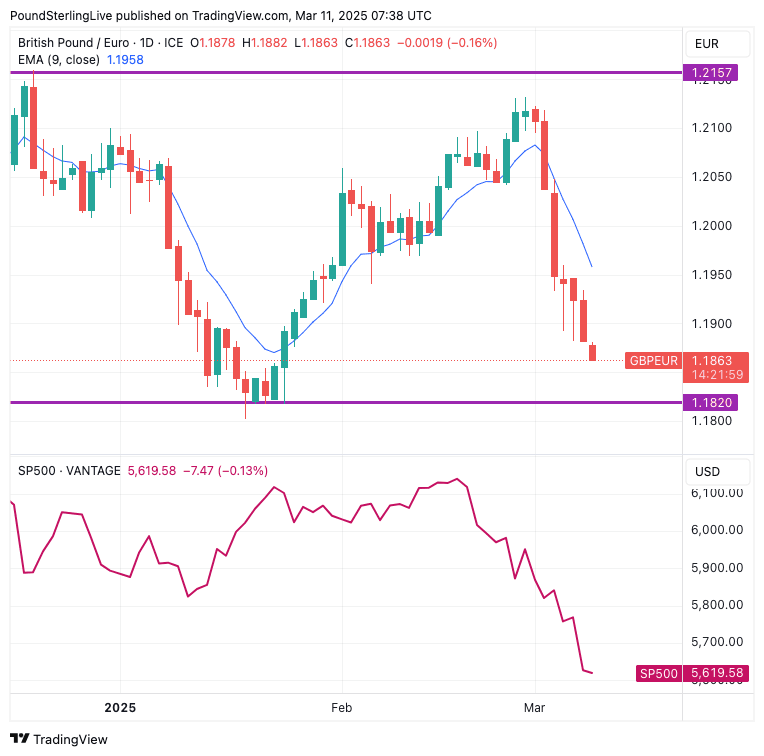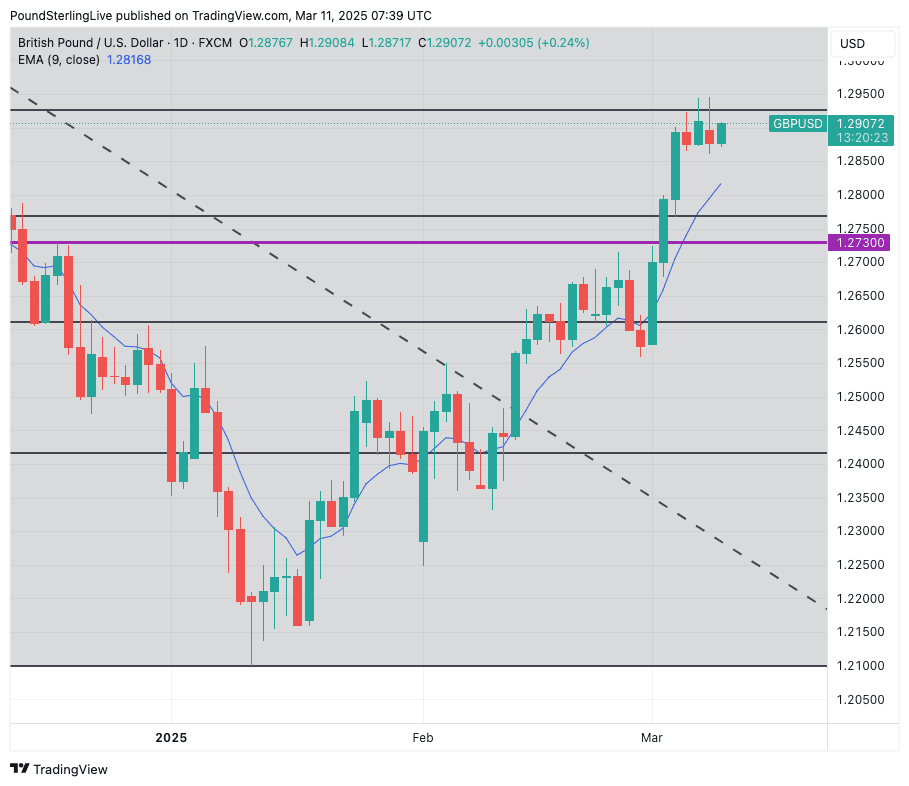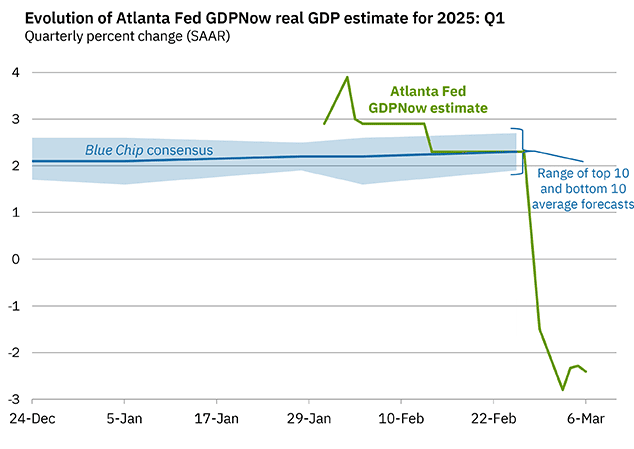
Image © Adobe Images
The British Pound's high beta to global equities leaves it softer against the Euro and U.S. Dollar.
A market selloff centered on U.S. equities accelerated over the past 24 hours, with spillover effects seen in global foreign exchange.
"When sentiment is positive, sterling appreciates; in negative global conditions, it becomes vulnerable," says George Vessey, Lead FX Strategist at Convera.
Concerns over the direction of the U.S. economy under Donald Trump saw the Nasdaq technology index fall by 4% and the S&P 500 by 2.5%.
The Pound fell against the Euro and Dollar but extended gains against 'high beta' currencies like the New Zealand and Australian Dollars, which are particularly prone in 'risk off' episodes.
The Pound-to-Euro exchange rate extended a run of losses to below 1.19, going as low as 1.1866 on Tuesday. The Pound-to-Dollar exchange rate snapped a run of gains to fall to a daily low of 1.2860.
"U.S. technology stocks experienced a sharp decline on Monday due to concerns over President Donald Trump's unpredictable trade policies and potential economic downturns. Major tech companies like Tesla, Amazon, and Microsoft saw large losses," says Shane Strowmatt, an analyst at LGT Private Bank.
Above: GBPEUR tracks the S&P 500 lower.
Trump on Sunday acknowledged the U.S. economy might fall into recession, while recently abandoning a long-held obsession with stock market performance, saying he doesn't watch it anymore.
The "Trump put" of his first term is certainly no longer to equity investors, which is potentially increasing market concerns.
"We find the G10 currencies most vulnerable to risk-off are the NZD and GBP," says BNP Paribas in a recent FX research note.
Although the Pound has come under pressure against the Euro, it remains relatively well supported against the U.S. Dollar.
Above: Despite the equity selloff, GBPUSD remains in an uptrend.
This is because the locus of market concerns is on the U.S. economy, where signs of a slowdown and higher inflation mix to create fears of stagflation.
Because of this, the Federal Reserve will have to cut interest rates again, but not by as much as would normally be the case in an economic downturn, creating a worst-case outcome for the Dollar and stock investors.
The Atlanta Federal Reserve's real-time measure of GDP growth is now forecasting that U.S. GDP growth for the first quarter has dropped to -2.8% from -1.5%.
"It's ridiculous for anyone to claim that foreign nations have more to lose from a trade war than the U.S. Tariffs are taxes on imports. The U.S. is more dependent on imports than any other nation. Therefore, the U.S. has more to lose from a trade war than any other nation!" explains Peter Schiff, Chief Economist and Global Strategist at Euro Pacific.
U.S. stocks are downgraded to neutral from overweight at Citi, where strategist Dirk Willer says, "U.S. exceptionalism is at least pausing".
HSBC equity strategists have also cut U.S. equities to neutral, saying it sees "better opportunities elsewhere for now."
The FTSE 100 and European markets have also come under pressure, but not by nearly as much as U.S. counterparts. This speaks to an ongoing outperformance of these assets in 2025, and ongoing rotation away from the U.S. can create supportive capital flows for the Pound and Euro against the Dollar.
However, equity outperformance is most noticeable in Germany, where plans to significantly raise spending are seen as a watershed moment for Europe's largest economy.
Germany's DAX Index has advanced almost 14% this year and speaks of ongoing demand for European assets that can ultimately boost Euro outperformance against the Pound Sterling and the Dollar.

Above: Germany's DAX outperforms the S&P500.
"We had shaded our longer-term core bullish USD view over the past couple of weeks, but we now abandon that viewpoint entirely. The dollar index has broken down offering some technical confirmation of that shift too. We’d start to add long EUR positions to our already long JPY preference," says Nick Kennedy, FX strategist at Lloyds Bank.
A slowdown in U.S. economic data is becoming clear, which is leading financial markets to bet on further interest rate cuts at the Federal Reserve. Money markets show investors are pricing in 75 basis points of cuts by the December meeting.
This implies three 25bp cuts, which is up from the solitary cut expected at the start of February. This is weighing on U.S. bond yields, which in turn mechanically weighs on the Dollar.



